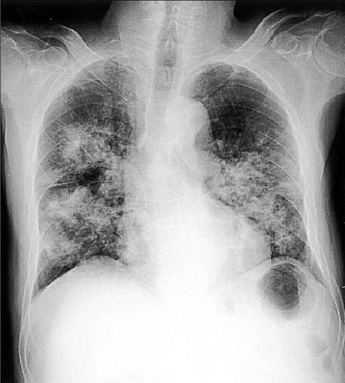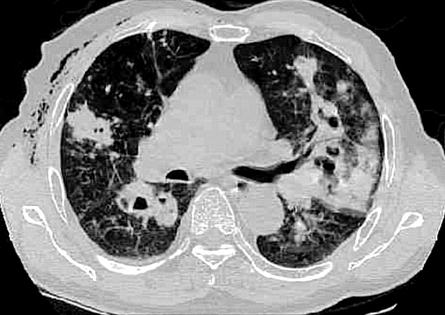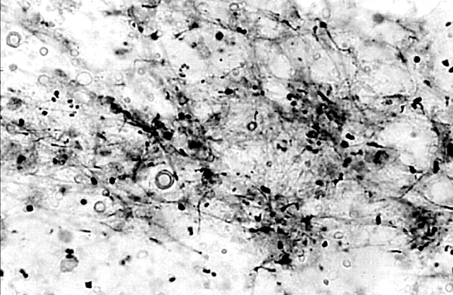Yonsei Med J.
2005 Feb;46(1):173-176. 10.3349/ymj.2005.46.1.173.
A Case of Pulmonary Cryptococcosis with Non-Small Cell Lung Cancer in Idiopathic CD4+ T-Lymphocytopenia
- Affiliations
-
- 1Department of Internal Medicine, Inha University College of Medicine, Incheon, Korea. jaehwa. cho@inha.ac.kr
- 2Department of Pathology, Inha University College of Medicine, Incheon, Korea.
- 3Department of Chest Surgery, Inha University College of Medicine, Incheon, Korea.
- KMID: 2158131
- DOI: http://doi.org/10.3349/ymj.2005.46.1.173
Abstract
- Cryptococcus neoformans commonly causes opportunistic infections in immunocompromised patients, especially in patients with AIDS. CD4+ T-lymphocytopenia in AIDS indicates an increased risk of opportunistic infection and a decline in immunological function. Idiopathic CD4 T-lymphocytopenia (ICL) is characterized by depletions in the CD4+ T-cell subsets, without evidence of HIV infection. Immunodeficiency can exist in the absence of laboratory evidence of HIV infection, and T-cell subsets should be evaluated in patients who present with unusual opportunistic infections. We report a case of pulmonary cryptococcosis and lung cancer in a patient with persistently low CD4+ cell counts, without evidence of HIV infection.
MeSH Terms
Figure
Cited by 1 articles
-
Multiple Opportunistic Infections and Primary Central Nervous System Lymphoma in a Patient with Idiopathic CD4+ T-lymphocytopenia
Jin-Su Song, Pyeong Gyun Choe, Kyoung-Ho Song, Kyoung Un Park, Wan Beom Park, Sang Won Park, Nam Joong Kim, Myoung-don Oh, Hong Bin Kim
Infect Chemother. 2012;44(1):17-21. doi: 10.3947/ic.2012.44.1.17.
Reference
-
1. Centers for Disease Control and Prevention. Unexplained CD4+ T lymphocyte depletion in persons without evident HIV infection. MMWR. 1992. 41:541–545.2. Smith DK, Neal JJ, Holmberg DS. Unexplained opportunistic infections and CD4+ T lymphocytopenia without HIV infection. N Engl J Med. 1993. 328:373–379.3. Laurence J, Mitra D, Steiner M, Lynch DH, Siegal FP, Staiano-Coico L. Apoptotic depletion of CD4+ T cells in idiopathic CD4+ T lymphocytopenia. J Clin Invest. 1996. 97:672–680.4. Uehara T, Miyawaki T, Ohta K, Tamaru Y, Yokoi T, Nakamura S, et al. Apoptotic cell death of primed CD45RO+ T lymphocytes in Epstein-Barr virus-induced infectious mononucleosis. Blood. 1992. 80:452–458.5. Fauci AS. CD4 T-lymphocytopenia without HIV infection. no lights, no camera, just facts. N Engl J Med. 1993. 328:429–431.6. Yinnon AM, Rudensky B, Sagi E, Breuer G, Brautbar C, Polacheck I, et al. Invasive cryptococcosis in a family with epidermodysplasia verruciformis and idiopathic CD4 cell depletion. Clin Infect Dis. 1997. 25:1252–1253.7. Menon BS, Shuaib IL, Zamari M, Haq JA, Aiyar S, Noh LM. Idiopathic CD4+ T-lymphocytopenia in a child with disseminated cryptococcosis. Ann Trop Pediatr. 1998. 18:45–48.8. Chuck SL, Sande MA. Infections with Cryptococcus neoformans in the acquired immunodeficiency syndrome. N Engl J Med. 1989. 321:794–799.9. 1999 USPHS/IDSA guideline for the prevention of opportunistic infections in persons infected with human immunodeficiency virus. MMWR Morb Mortal Wkly Rep. 1999. 48:1–65.10. Pappas PG, Perfect JR, Cloud GA, Larsen RA, Pankey GA, Lancaster DJ, et al. Cryptococcosis in human immunodeficiency virus-negative patients in the era of effective azole therapy. Clin Infect Dis. 2001. 33:690–699.
- Full Text Links
- Actions
-
Cited
- CITED
-
- Close
- Share
- Similar articles
-
- A case of Idiopathic CD4+ T-Lymphocytopenia with disseminated Mycobacterium kansasii infection and Pulmonary alveolar proteinosis
- Motor Axonal Neuropathy Associated With Idiopathic CD4+ T-Lymphocytopenia
- A Case of Idiopathic CD4 + T Lymphocytopenia Associated with Kaposi's Sarcoma
- A Case of Idiopathic CD4+ T-lymphocytopenia Associated with Autoimmune Hemolytic Anemia
- Multiple Opportunistic Infections and Primary Central Nervous System Lymphoma in a Patient with Idiopathic CD4+ T-lymphocytopenia




